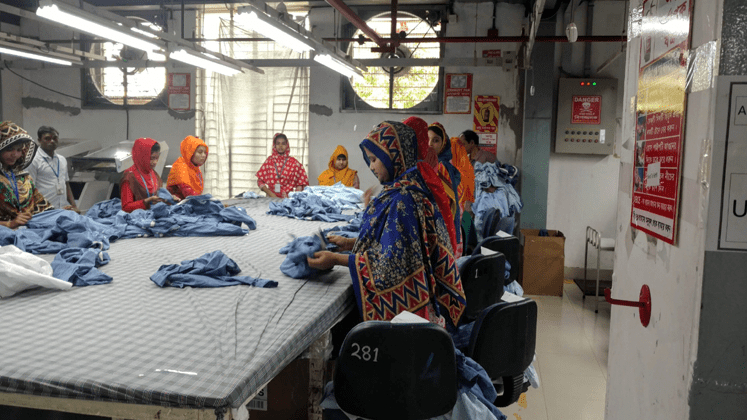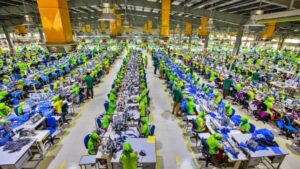
A recent study titled Recovery of the Apparels Sectors of Bangladesh from the COVID-19 Crisis: Is a Value Chain based Solution Possible? carried out by Centre for Policy Dialogue (CPD) of Bangladesh and Southern Voice, a private think tank in Sri Lanka underlined that global buyers should redistribute orders to support financially weak countries.
The report showed that among the top 20 apparel supplying countries, the market shares experienced significant changes between pre-COVID and post-COVID periods and the highest rise in market share was observed in China followed by Vietnam even as it maintained that if the market share of export orders is maintained by brands/buyers at the pre-COVID period in case of the largest supplier, China, an additional US $ 2 billion worth of orders could be distributed among other countries.
The fallouts of the Coronavirus pandemic had been rather devastating for the readymade garment sector of Bangladesh, on which principally dependent is the country’s economy and well-being.
Export debacle, price point taking a nosedive, large-scale order cancellations and extended payment terms by buyers are just a few of the challenges facing the garment makers in the wake of the breakout of the pandemic.
In light of the above developments, the approach of the global buyers, industry insiders feel, can go a long way towards improving the lot of the garment exporters and help the struggling garment sector come out of the woods.
If the countries, which have limited fiscal capacity, get additional amounts of orders from global brands and buyers, it could actually create employment and also could help suppliers to sustain their business, said the study titled Recovery of the Apparels Sectors of Bangladesh from the COVID-19 Crisis: Is a Value Chain based Solution Possible?
The study recommended launching a campaign with the cooperation and support of the Governments of the sourcing countries, major global brands and retailers, major supplying countries, trade bodies and international trade unions for ensuring fair distribution of orders by brands and retailers for the countries with limited fiscal capacities and potentials of high social impact even as it said that the Governments of the major sourcing countries should undertake necessary official positions and should encourage their local brands and buyers to follow a redistributive approach in case of import of apparels.
However, even as the study calls for redistribution of work orders, things do not look too bright on the order front, lately, to be honest! It may be mentioned here that as per a recent report of Reuters, apparel retailers in Europe and America continue to still sit on excess inventory and cut back on orders (for Spring), which is impacting the apparel manufacturers in Bangladesh adversely.
The report stated that some major retailers are still nursing last year’s clothes, which would have been sold off in clearance sales in normal times. British chain Primark, for example, reportedly told Reuters it was housing around 150 million pounds (US $ 205 million) worth of 2020 Spring/Summer stock and 200 million pounds from Autumn/Winter. Even as in an indication of the scale of the backlog, consultancy McKinsey says the value of unsold clothing worldwide, in stores and warehouses, ranges from US $ 168-192 billion, which is more than double the normal levels, the report claimed while adding that names like Britain’s Marks & Spencer and Germany’s Hugo Boss said they had placed smaller orders than usual for this year’s Spring collection.
Nevertheless, such developments are having an adverse impact on the manufacturing destinations like Bangladesh, whose economies rely on apparel exports.
As per reports, around 50 factories surveyed by the Bangladesh Garment Manufacturers and Exporters Association (BGMEA) said they had received 30 per cent fewer orders than usual this season, as pre-Christmas lockdowns in much of Europe followed by another clampdown in January, hit their businesses hard.
“We are operating at 25 per cent of capacity. I have some orders to run the factory till February. After that, I don’t know what future holds for us. It’s difficult to say how we will survive,” reportedly stated Miran Ali, garment manufacturer and Director of BGMEA, who reportedly owns four factories, adding, “At this point in time, I should have been entirely full until March at least, and looking at a healthy quantity for aAtumn/Winter coming in already. Across the board, that is coming slow.”
Meanwhile, as to the issue of redistribution of work orders, Regional Country Manager of H&M Bangladesh, Pakistan and Ethiopia, Ziaur Rahman, reportedly said that the country (Bangladesh) would have to invest more in innovation and research and development to retain increased export orders and went on to add that big and bulky suppliers and basic products were the foundation of Bangladesh RMG sector and the price of basic items would never be higher than the value-added products even as he emphasised investment in human development and increase in workers’ wages in readymade garment sector in Bangladesh. While Commerce Minister Tipu Munshi on his part reportedly stated that during COVID-19, the Government did its best to provide support in spite of limitations and Bangladesh had overcome several initial crises of the apparel industry, but the second wave could be more challenging while also adding that the Government, brands and buyers, factory owners and workers’ leaders need to work together to face the crisis.
In view of the second wave of the COVID-19 outbreak, garment exporters maintain the Government should consider the new stimulus for the RMG sector and extend the repayment tenure for the previous incentive package.
With reference to the same, recent media reports suggest that Bangladesh Prime Minister has reportedly expressed her consent to extend moratorium facility for six more months for the loans that readymade garment factory owners received under the stimulus packages.
Premier Sheikh Hasina came up with the consent at a meeting with a three-member delegation of RMG factory owners recently, claimed the report adding Faruque Hossain, Panel Leader of Sammilita Parishad, confirmed the matter, and added that a formal notification will be issued in this connection soon.
Tipu Munshi, who is also President of the Sammilita Parishad, led the delegation, while the other members were Shafiul Islam Mohiuddin, former president of BGMEA and SA Mannan Kochi, its incumbent vice-president.
Under the stimulus packages, the Government has disbursed a total of Taka 10,500 crore as loan to the apparel exporters. It allocated Taka 5000 crore for workers’ three months’ wages with 2 per cent service charge and another Taka 30,000 crore with 4 per cent interest for working capital. The repayment of the loan was scheduled to commence on 25 January but due to adverse situation, the apparel exporters failed to repay the instalment.
“That is why we demanded that the loan moratorium be extended further, reportedly stated SA Mannan Kochi speaking to the media while adding that the apparel exporters have no capacity to repay the loans, but the banks are forcing to repay the instalments in due time.
So, even as the Government seems to be thinking of ways and means to ease the financial burden of the garment makers by facilitating extended loan moratorium period, global buyers would do good to take a redistributive approach on order placements, as has been underlined in the study conducted by the CPD and the Southern Voice.






